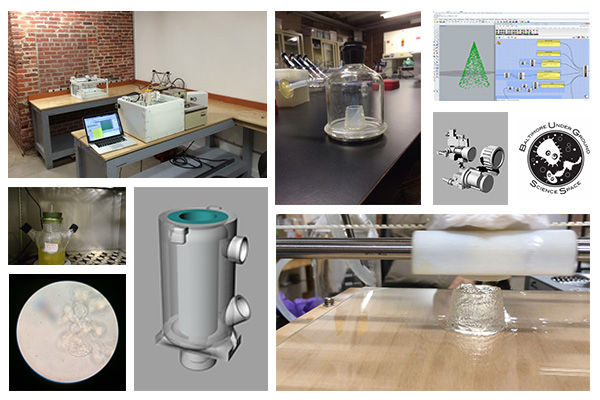Bioprinting Overview

I am working in collaboration with several people at the Baltimore Under Ground Science Space, a community biology lab, to develop a 3D printer capable of printing biological material. We are an interdisciplinary group of biologists, engineers, and artists. We are exploring multiple approaches to bioprinting including syringe-based printing of cells suspended in agar, filament-based printing with polycaprolactone, and DLP Stereolithography with photopolymer hydrogels. We have focused on printing with plant cells and genetically engineered bacteria, but will likely expand into working with mammalian cells in the future. Our work is related to much of the research in organ printing, but is also inspired by exciting new work in biofabrication that utilizes biology to create novel materials and forms. Our creative approach leverages and advances open-source technology with innovations in hardware, software, biological media, and protocols.
The group meets weekly and interested people are welcome to join. Email ryan@ryanhoover.org for more info.
The group meets weekly and interested people are welcome to join. Email ryan@ryanhoover.org for more info.
Software
Xylinus is a 3D print control tool suite for Rhino/Grasshopper. Though useful for many applications, it was developed specifically for bioprinting. Xylinus and Alba (for doing synthetic biology in Grasshopper) can be downloaded here.Biopting Breakout

BioPrinting Breakout is a bi-annual workshop on bioprinting and 3D tissue engineering designed to bring scientists into the public to talk about their work and kick start new initiatives related to this technology. Expert researchers in this field present their work and lead hands-on demos for an audience of other scientists, engineers, artists, makers and hackers.
More information and videos of the 2015 talks can be found at BioPrintingBreakout.com.
Proposals for BioPrinting Breakout 2017 will be accepted starting in Oct 2016.
More information and videos of the 2015 talks can be found at BioPrintingBreakout.com.
Proposals for BioPrinting Breakout 2017 will be accepted starting in Oct 2016.